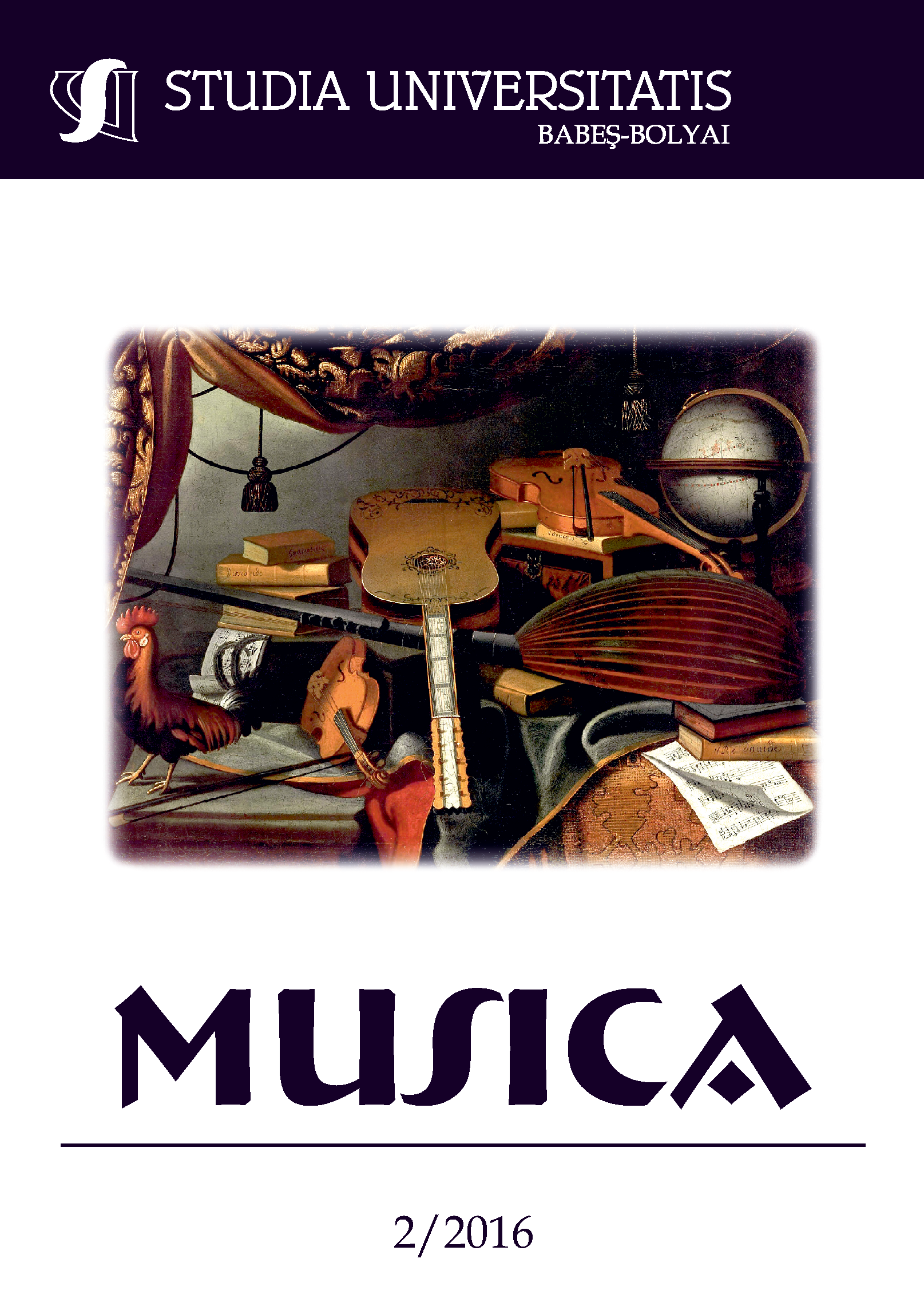INCORPORATING EXPERIENCE-BASED CONCERTS INTO PUBLIC EDUCATION
Keywords:
music education, music pedagogy, concert pedagogy, listening to musicAbstract
All over the world, the past decades have seen a continuous decrease in the number of the audiences at classical music concerts. It is not only I who has long been occupied with the question of how to make classical music popular with the young generation. The education of the audience has been gaining ground recently in the policies of concert organisers and professional performing ensembles. The aim of innovative experience-based concerts is to complement the musical education of school-age children by familiarising them with the art of listening to music. Presenting the values of classical music, which is the main task of this mission, is in the interest of performers and audiences alike as they are in an interdependent relationship. Examining the habits of listening to music not only as cultural consumption but also as an educational issue, we lay emphasis on the methods of musical education and educating lovers of music. For this purpose, we focus on the development of an adequate receptive attitude and the improvement of receptive competencies. We have studied how the effective presentation of music and educational concerts can complement school-age children’s musical education in an experience-based way and familiarise them with the art of listening to music.References
Bácskai E. Manchin R. Sági M. Vitányi I. Ének-zenei iskolába jártak (They were students of a school specialised in music), Zeneműkiadó, Budapest, 1972.
Barkóczi I. Pléh Cs. Kodály zenei nevelési módszerének pszichológiai hatásvizsgálata (The effect of Kodály’s musical training on psychological development), Kodály Zoltán Zenepedagógiai Intézet, Kecskemét, 1978
Coca G. Az általános tanulmányi eredmények pozitív befolyásolása és a képességek fejlesztése zene által. (The positiv influence of music on general academic achievements and development of skills). http://igy-kutatunk-mi.webnode.hu/news/tudas-tanulas-szabadsag/ (2014).
Del Grosso Dentreri, L. Response of tradition & change in music. In: Dobbs J. (ed.) International Music Education ISME Yearbook volume IX. Chin Long Printing Service, Singapore, 1982, 40-41.
Dombiné Kemény E. A zenei képességeket vizsgáló standard tesztek bemutatása, összehasonlítása és hazai alkalmazásának tapasztalata.(Presentation and comparison of standard tests examining musical abilities, and their use in Hungary) In: Czeizel Endre és Batta András (szerk.): A zenei tehetség gyökerei. Mahler Marcell Alapítvány Arktisz Kiadó, Budapest, 1992, 207–244.
Hanslick, E. A zenei szép. Javaslat a zene esztétikájának újragondolására (On the musically beautiful. A contribution towards the revision of the aesthetics of music). Budapest: Typotex 2007.
Harnoncourt, N. A beszédszerű zene. Utak egy új zeneértés felé. (Music as Speech. Ways to a New Understanding of Music). Budapest: Editio Musica.1988.
Hausmann Kóródy A. A középiskolások zenei ízlése. PedActa, ISSN 2248-3527, 3/2. 1-12 p. 2013.
Kodály Z. Visszatekintés. Összegyűjtött írások, beszédek, nyilatkozatok I. (Looking back. Collected writings, speeches, statements) Zeneműkiadó, Budapest, 1982.
Kokas K. Képességfejlesztés zenei neveléssel (Development of musical ability with education) Zeneműkiadó, Budapest, 1972.
Laczó Z. Az ének-zene tanítás célja és feladatai. Zenehallgatás. In: Az általános iskolai nevelés és oktatás terve. Tantervi Útmutató. Ének-Zene 1-4. osztály (The goal and tasks of music education. Listening to music. In: Curriculum guide. Singing and music in classes 1-4), Tankönyvkiadó, Budapest, 1979.
Körber T. A zene és a tánc. (Music and dance), Nemzeti Tankönyvkiadó, Budapest, 1995.
Körmendy Zs. A koncertpedagógia elméletének multidiszciplináris alapjai. (Multi-disciplinary foundations of the theory of concert pedagogy) In: Sokszínű pedagógiai kultúra, http://www.irisro.org/pedagogia2014januar/03111KormendyZsolt.pdf, 2014
Losonczy Á. A zene életének szociológiája. (The sociology of the life of music). Budapest, Zeneműkiadó. 1969.
Mertens, G. Zwischen Bildungsauftrag und Feigenblatt In: Das Orchester, 1, 136 2005.
Mertens G., Farish M., Lesle L.. Stiller B. Közönség-utánpótlás a szimfonikus zenekaroknál (Symphonic orchestras’ audience education) Das Orchester 2 In: Zenekar XII. 25, 2005, 15-20.
Pécsi G. Kulcs a muzsikához (Key to music) Tankönyvkiadó, Budapest, 1991.
Perelman, N: Zongoraóra (Piano lesson) Zeneműkiadó, Budapest, 1983.
Péter É. Competence based music teaching, STUDIA UBB MUSICA, LVIII, 2, 2013 (p. 143 – 149).
Sáry L. Kreatív zenei gyakorlatok (Creative musical exercises), Jelenkor Kiadó, Pécs, 1999.
Stachó L. Ének, öröm és haszon a Kodály- módszerben. (Singing, pleasure and usefulness in the Kodaly method). In: Parlando, 50/2. 21-28. http://www.parlando.hu/Kodaly-emlekev-Szeged-2008-2.htm, 2008 last downloaded: 9 September 2016.
Szabó Cs. Hogyan tanítsuk korunk zenéjét (How to teach the music of our time) Kriterion Könyvkiadó, Bukarest, 1977.
Váradi J. Hogyan neveljünk értő közönséget a komolyzenének. (How to educate an audience to acquire a taste for classical music) Academic dissertation PhD, Jyväskylä, 2010.
Online Sources
European Association for Music in Schools http://www.eas-music.org/en/activities/eas-conferences/2015-rostock-de/theme-programme/, last downloaded: 5 January 2015
év 2008 XCIX törvény az előadó-művészeti szervezetek támogatásáról és sajátos foglalkoztatási szabályairól. (Act XCIX of 2008 on the support and special employment rules of performing arts organisations)
http://net.jogtar.hu/jr/gen/hjegy_doc.cgi?docid=A0800099.TV, last downloaded: 5 January 2015
Downloads
Published
How to Cite
Issue
Section
License
Copyright (c) 2016 Studia Universitatis Babeș-Bolyai Musica

This work is licensed under a Creative Commons Attribution-NonCommercial-NoDerivatives 4.0 International License.






